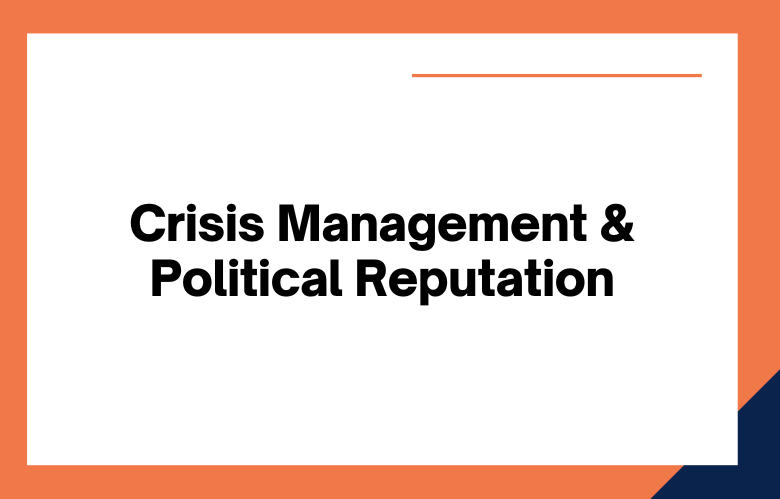In politics, a crisis is unpredictable and threatens to harm a politician’s reputation. A situation can be anything from a sex scandal to a financial scandal. No matter the cause, a crisis always has the potential to do severe damage to a politician’s reputation.
When faced with a crisis, the most important thing for a politician is to take immediate and decisive action. The longer a politician waits to address a problem, the more damage it will affect their reputation.
A politician needs to be honest and transparent when addressing a crisis. It will help to build trust with the public and show that the politician is taking the situation seriously.
Crisis Management in Politics
What is a Crisis?
A crisis is an unplanned, unexpected event that can cause negative consequences and damage a political reputation.
In today’s age of social media and 24-hour news cycles, it is more important than ever for politicians to prepare for a crisis.
While it is impossible to predict when a crisis will occur, there are steps that politicians can take to minimize the damage to their reputations.
Have a Plan
The first step in minimizing damage to your political reputation is knowing how to respond quickly and effectively.
This means having a team who knows their roles and what needs to be done during a crisis.
It also means having clear and concise communication plans so everyone is on the same page.
By being prepared, you can avoid the chaos that often accompanies an unplanned event.
Take Responsibility
The second step is to be prepared to take responsibility for your actions and accept blame when necessary.
This means honesty about what happened and owning your part in the crisis.
It also means apologizing sincerely for any harm that was caused as a result of the crisis.
Taking responsibility for your actions will show the public that you are accountable for your behavior and are willing to make things right.
Be Transparent
Third, you must be transparent in your communications and show genuine empathy for those affected by the crisis.
This means keeping the lines of communication open so that people can ask questions and get information about what is happening.
It shows that you know the gravity of the situation and its impact on those involved.
Being transparent with your communications will gain the public’s trust and show you are committed to solving the problem.
Learn from Your Mistakes
The fourth step is learning from your mistakes and ensuring you do not repeat them in future crises.
This means taking time to reflect on what was wrong and what could be done better after the dust has settled.
It also means making changes to prepare you for future crises.
By learning from your mistakes, you can ensure that you can handle future crises more effectively and that your political reputation remains intact.
Types of Crisis Management
There are two types of crisis management that politicians can use: offensive and defensive.
Offensive Crisis Management
Offensive crisis management is when a politician takes proactive steps to prevent a crisis from happening.
This can be done by putting systems and processes in place that will help to mitigate risks.
For example, a politician might create guidelines for social media use or limit campaign contributions.
Defensive Crisis Management
Defensive crisis management is when a politician takes reactive steps to address a crisis after it has already occurred.
Usually, it involves issuing an apology, holding a press conference, or taking responsibility for the problem.
Defensive measures need to be taken quickly and effectively to minimize the damage caused by the crisis.
Be Prepared
Have a crisis management plan in place before anything happens.
This way, you and your team will know exactly what to do when a negative situation arises.
By being prepared, you can avoid making things worse and minimize the damage.
Act Quickly
As soon as you become aware of that potentially damaging situation, take action immediately.
As soon as you notice the issue, time is of the essence regarding damage control.
Own up to Your Mistakes
If you’re at fault, admit it and apologize.
Trying to cover up or deny what happened will only make things worse.
Honesty is the best when it comes to damage control.
Keep Your Cool
It can be easy to say or do something you’ll later regret in the peak moment.
Avoid this by remaining calm and level-headed no matter what comes your way.
This way, you can make thoughtful decisions that will protect your reputation.
Deny, Deny, Deny
This may seem obvious, but it’s important to remember that admitting wrongdoing is tantamount to career suicide in politics.
You might be tempted to come clean and take responsibility, hoping it will make the situation disappear more quickly, but trust us – it’s not worth it.
Denial is always the best policy in these situations.
Play the Victim Card
One of the most effective ways to deflect blame in a political crisis is to position yourself as the victim.
Whether you were set up by your opponents or unfairly targeted by the media, portraying yourself as someone wrong will help gain sympathy from the public.
Attack Your Opponents
This strategy can be risky, but if executed correctly, it can work in your favor.
By going on the offensive and attacking your opponents, you’ll divert attention away from whatever controversy you’re currently facing and put them on the defensive instead.
Be careful not to be too aggressive – you don’t want to alienate potential voters.
Find a Scapegoat
Finding someone else to take the fall for your scandal is always an option if all else fails.
Whether it’s a member of your staff or someone else, sacrificing someone else to save your skin is a time-honored tradition in politics.
Just be warned that this strategy can backfire if not done carefully – if you’re caught trying to pin the blame on someone innocent, it will reflect poorly on you and could do even more damage to your reputation than the scandal itself.
Be Proactive, Not Reactive
The foremost step in effective crisis management is to be proactive, not reactive.
This means having a plan in place before a crisis ever occurs.
By being proactive, you can take steps to prevent crises from happening in the first place.
And if a crisis occurs, you’ll already have a plan to deal with it quickly and effectively.
Communicate Quickly and Often
If a crisis does occur, it’s essential to communicate quickly and often with all stakeholders involved.
This includes employees, customers, shareholders, and the general public.
The goal is to keep everyone informed of the situation and what steps are being taken to resolve it.
Be transparent in your communications; people are more likely to trust you if they feel they’re getting the whole story.
Take Responsibility
One of the worst things in a crisis is to try to shift the blame onto someone else.
Own up to it if you’re at fault and take responsibility for your actions.
People will respect you more for owning up to your mistakes than for trying to cover them up.
And even if you’re not at fault, taking responsibility shows you’re willing to work towards a resolution.
Learn from Your Mistakes
Once a crisis has been resolved, taking the time to learn from your mistakes is essential. What went wrong?
What could be done differently? What steps can be taken in the future to prevent similar crises from happening?
By learning from your mistakes, you can ensure that future crises are dealt with quickly and effectively.
Monitor Social Media
Social media platforms like Twitter and Facebook move at lightning speed and can be a goldmine for early warning signs of a brewing crisis.
By monitoring social media, you can get ahead of a problem before it can explode into something bigger.
Act Quickly
Once you’re aware of a problem, it’s vital to take quick action to address it.
The longer You wait, the worse the situation will become
Often, it takes a simple apology or explanation to diffuse the situation.
Be Transparent
In today’s digital age, people expect transparency from their politicians. Withholding information or being evasive will only make the situation worse.
People will be more likely to forgive and move on if you’re open and honest about what happened.
Developing a Plan of Action
The first step is to identify the goals of the response. What do you hope to achieve?
Once you clearly understand the goals, you can start developing specific strategies.
These strategies should address the immediate needs of those affected by the crisis and the long-term goal of maintaining your political reputation.
The most crucial aspect of any plan is communication.
It would help if you were clear and concise when communicating with the public so that they understand what is happening and why you are taking specific actions.
Being honest and transparent about any challenges or setbacks is also essential.
People are more likely to forgive mistakes if they feel like they were honestly communicated about them from the start.
It’s essential to have a mechanism for collecting feedback from those affected by the crisis.
This feedback can help you fine-tune your strategy as things change and evolve.
It also shows that you’re genuinely interested in helping those impacted by the situation.
Understand the Situation
The first step in crisis management is to understand the situation.
This means gathering as much information as possible about what has happened and why.
A clear picture of the situation is crucial to making an informed decision.
Identify Your Goals
Once you clearly understand the situation, you need to identify your goals.
What do you hope to achieve by managing this crisis?
Do you want to protect your political reputation?
Do you want to avoid further damage to your reputation?
Or do you want to take advantage of the situation to improve your political standing?
Develop a Plan
After you have identified your goals, you need to develop a plan.
This plan should be based on thoroughly understanding the situation and your goals. It should also be realistic and achievable.
Implement the Plan
Once you have developed a plan, it is time to implement it.
This may involve making difficult decisions and taking risks, but it is essential to stick to the plan if you want it to be successful.
Monitor the Situation
Even after implementing your plan, it is vital to monitor the situation closely.
Things can change quickly in a crisis, so it is essential to be prepared to adjust your plan if necessary.
Immediately Acknowledge the Problem
When a crisis occurs, it is vital to acknowledge the problem immediately. It shows that you are aware of the situation and are taking steps to address it.
It can help to calm any public fears or concerns that may be present.
Appoint a Spokesperson
It is also essential to appoint a spokesperson to act as the face of the organization during the crisis.
This person should be calm, level-headed, and able to communicate effectively with the public.
Develop a Plan of Action
Once the problem has been acknowledged, it is essential to develop a plan of action to address it. This plan should be designed to resolve the issue as quickly and efficiently as possible. Additionally, it should be communicated to all relevant parties, including employees, shareholders, and customers.
Take Responsibility for the Problem
As the organization’s leader, you are responsible for taking ownership of the problem and solving it. This includes taking responsibility for any damage that the crisis may have caused. Additionally, it is important to apologize for any inconvenience that has been caused.
Keep Employees Informed
During a crisis, it is essential to keep employees informed of developments. This helps to ensure that they know the steps to resolve the issue and helps prevent rumors from spreading. Additionally, employees should be given clear instructions on handling customer inquiries during this time.
Keep Customers Informed
Customers should also keep informed of the developments during a crisis. This can be done through email, social media, or even direct mail. Customers appreciate being held in the loop, which can help prevent them from taking their business elsewhere.
Monitor Social Media
Social media can be both a blessing and a curse during a crisis.
On the one hand, it can be used to disseminate information about the situation quickly.
On the other hand, it also is used by customers or others to spread rumors or misinformation about what is happening.
It is essential to monitor social media closely during a crisis and take steps to correct any false information that may be circulating.
Understand the Problem
The first step in crisis management is to understand the problem.
This means taking the time to gather information and get a clear picture of what has happened.
This step is crucial because it will help you determine the best course of action.
Identify Your Goals
The next step is to identify your goals. What do you hope to achieve by managing this crisis?
What are your objectives?
Once you have identified your goals, you can develop an action plan.
Develop a Plan
The third step is to develop a plan of action.
This plan should be designed to achieve your goals and objectives.
It should be comprehensive, well-thought-out, and designed to address all aspects of the crisis.
Implement the Plan
Once you have developed a plan, the fourth step is to implement it.
This means implementing the plan and taking all necessary steps to address the crisis.
This may include issuing statements, holding press conferences, or taking other actions as necessary.
Evaluate the Results
After implementing your plan, the fifth step is to evaluate the results.
This means assessing how well the plan worked and whether it helped you achieve your goals.
If the plan was successful, consider using it again in future crises.
If it was unsuccessful, consider revising it or trying another approach.
Immediately Acknowledge the Problem
When a crisis occurs, it is vital to acknowledge the problem immediately.
This shows that you are taking the situation seriously and are committed to addressing it.
It can help to prevent further damage to your reputation, as people are more likely to forgive a mistake that has been openly acknowledged than one that has been denied or downplayed.
Take Responsibility for the Problem
It is also essential to take responsibility for the problem.
It shows that you are willing to accept blame for what has happened and are committed to making things right.
People are more likely to forgive someone who takes responsibility for their actions than someone who tries to shift blame onto others.
Be Open and Transparent about the Problem
When addressing a crisis, being transparent about what has happened is essential.
This means providing as much information as possible about the situation and being honest about any mistakes that have been made.
People appreciate honesty and will likely trust you if they feel you are open with them.
Have a Plan to Solve the Problem
It is also essential to have a plan in place to solve the problem.
This shows that you are taking the situation seriously and are committed to finding a resolution.
People are more likely to trust you if they feel you have a handle on the situation and know what should be done.
Take Action to Solve the Problem
Once you have a plan in place, it is crucial to take action to implement it.
This shows that you are not paying lip service to the problem but are committed to solving it.
Taking action will help to build trust with people as they will see that you are following through on your promises.
Be Willing to Make Changes
Solving a crisis may sometimes require making changes to your plans or policies.
Being willing to make these changes is essential as they show that you are flexible and adaptable in times of adversity.
Understand the Situation
The first step in crisis management is to understand the situation.
This means gathering as much information as possible about what has happened and why.
Once you understand the situation, you can develop a plan to address it.
Develop a Plan
After you have gathered information about the situation, you need to develop a plan to address it.
This plan should include what you want, how you will achieve it, and who will be responsible for each task.
It is essential to ensure that your plan is realistic to avoid further damage to your reputation.
Implement the Plan
Once you have developed a plan, you need to implement it.
This may require making some difficult decisions, but sticking to your plan to minimize damage to your reputation is essential.
Monitor the Situation
Once you have implemented your plan, you must monitor the situation closely. This means staying up-to-date on new developments and adjusting your project as necessary.
If the situation improves, you can begin to relax your monitoring; however, if the situation deteriorates, you must take more drastic measures.
Be prepared for Negative Publicity.
No matter how well you manage a crisis, there is always a chance you will face negative Publicity.
This can damage your reputation, but it is essential to remember that only some publicity is terrible.
If you handle the situation well, the negative Publicity may end up helping your reputation in the long run by showing that you can handle difficult situations effectively.
Monitor the Situation
Once the plan is implemented, it is crucial to monitor the situation closely.
This means paying attention to how the public reacts and whether or not the damage is mitigated.
It is essential to adjust the plan as needed to ensure its success.
Be prepared for Long-Term Damage Control.
Even if you successfully mitigate the damage from a crisis, long-term consequences may need to be dealt with.
This could include negative Publicity, loss of support from voters, or damage to your political reputation.
Preparing for these eventualities and planning how to deal with them is essential.
Conclusion
Crisis management is an essential part of being a successful politician. Politicians can minimize the damage caused by a crisis and protect their reputations by taking proactive and reactive measures.
A successful political career entails proactively preparing for a crisis, carefully building a positive reputation, and knowing how to respond if disaster strikes quickly.
Understanding the basics of crisis management can insulate your political aspirations from potential derailment.
If you need help developing or implementing a comprehensive strategy for managing risk and protecting your good name, we invite you to contact us for a consultation.
Call: +91 9848321284
Email: [email protected]











